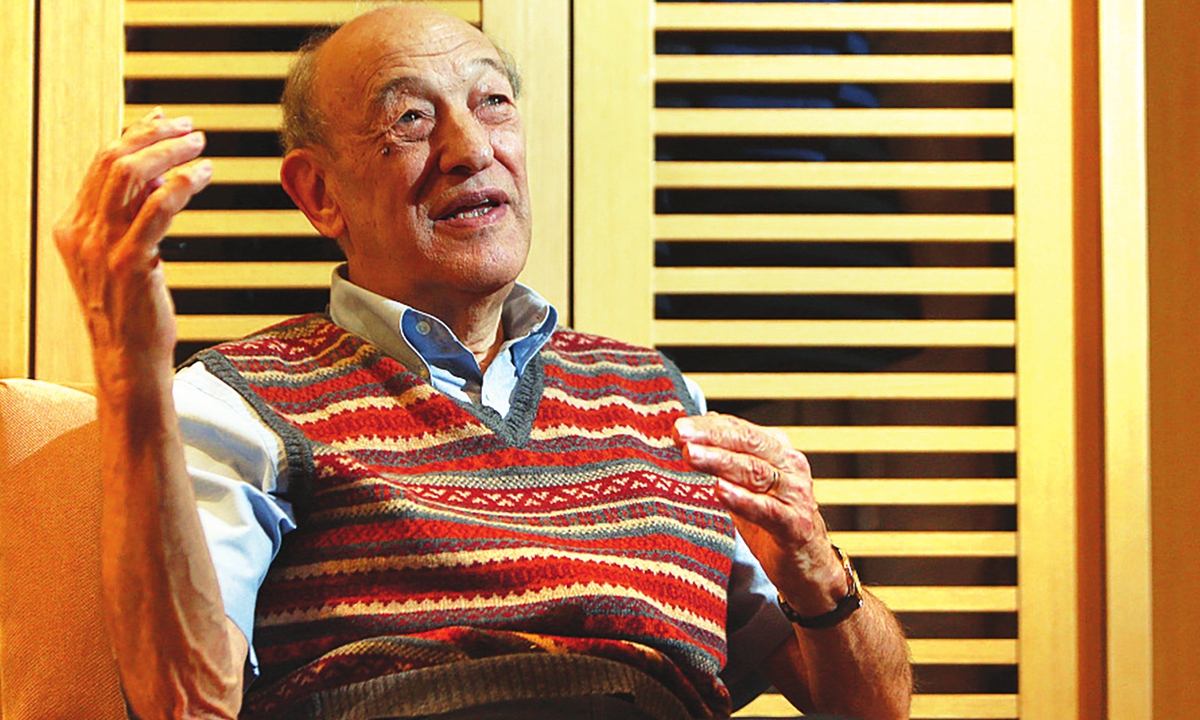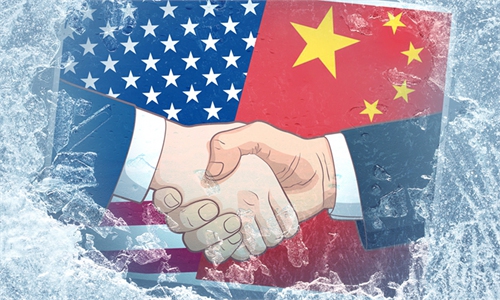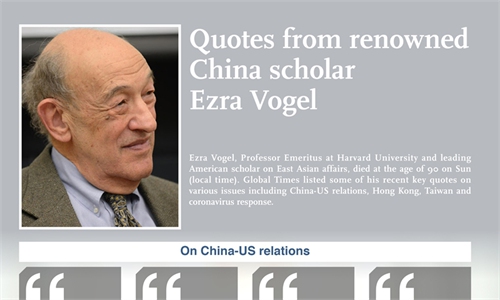Toward better management of US-China relations

Ezra Vogel. Photo: VCG
Editor's Note:This statement calling for managed competition and greater US-China cooperation was one of Ezra Vogel's last intellectual initiatives. It was drafted by Ezra, in consultation with Wang Jisi of Peking University, but had not yet been completed at the time of Ezra's death. Robert Ross and Michael Szonyi, Ezra's colleagues at the Fairbank Center, edited his final draft for clarity and concision, while seeking to remain true to his efforts and his vision for US-China relations. It's made public as one of the ways to honor distinguished scholar Ezra Vogel.
Ezra was hoping to produce a consensus document that could be endorsed by scholars in both countries. His statement does not address some of the most important and troubling issues in US-China relations. But the statement does convey some convictions that many share with him: that war between the US and China will do great harm to both countries; that indiscriminate decoupling is not the solution to the problems in the relationship; that cooperation is essential if we hope to address the many pressing global issues such as climate change and global health, and that the continued exchange of legitimate scholars, journalists, and many others is essential to a healthy relationship.
In 2020, US-China relations reached their worst point since the re-opening of relations in the early 1970s. Instead of cooperating to cope with the coronavirus, we blamed each other for the origins. Instead of cooperating to maintain stable international economic relations, we carried on a trade war and disrupted supply lines, creating uncertainties for businesses around the world. Instead of increasing the number of reporters in each country who could promote mutual understanding, both countries imposed new restrictions that limit the number. Scholarly contact has been greatly reduced. Tensions over Taiwan and in the South China Sea have increased. The risk of conflict of devastating consequences to both countries has also increased. None of these developments is in the interest of either of the two countries.
Given the broad-based competition and rising tensions between the two countries, and the different perspectives of the leaders and the public in the two countries, great progress in improving relations in the near future may be impossible. However, the arrival of a new administration in the US in January 2021 provides an opportunity to make adjustments in the management of the relations that would reduce the risk of conflict and increase cooperation to pursue common interests.
Political forces in both countries will make it difficult to promote cooperation with the other. President Joe Biden will be under pressure to ensure that he is not seen as weaker than his predecessor in dealing with China. He is unlikely to remove trade barriers without some concessions by China to remove restrictions on US companies in China. Many American leaders believe that China treats American companies unfairly and, despite some recent improvements, has been lax in protecting intellectual property. Chinese officials believe they are in a strong position in dealing with the US and should not yield to US complaints. Chinese officials also believe the US seeks to interfere with Chinese businesses throughout the world. Yet the two countries can avoid a vicious cycle of potentially endless further restrictions that would harm both.
We can begin by 1) cooperating in areas that are of clear mutual interest, 2) taking steps that prevent our relations from getting worse, 3) agreeing on some basic principles to govern international institutions.
Cooperating in areas of clear mutual interest
a. Reopening of contacts that have been removed
To deal with ongoing issues between the two countries we need enhanced contacts at four levels: top leaders; senior diplomats and military leaders dealing with major issues; working-level diplomats and specialists in various locations - in China, the US, and in international institutions, and in the private sector between business groups, academics, students, and other groups of private citizens.
Top leaders: Fortunately, Xi Jinping, President of the People's Republic of China, and Joe Biden, President of the United States, have had numerous hours of contact when they were both vice presidents. They can set the general tone for relations between the two countries, begin to set the agenda for working-level cooperation on various issues, and lay the basis for addressing key policy issues.
Political and military leaders: Fruitful meetings are already taking place between military representatives of the two countries on how to avoid accidents. Conversations should proceed on how our countries can avoid conflict over other issues, including Taiwan, the South China Sea, the Western Pacific, and nuclear proliferation in the Middle East and Northeast Asia. The US can reduce Chinese concerns about their security in the waters around China, while China should reassure the US and other countries about freedom of navigation in East Asian waters.
Functional-level contacts: Dialogues between experts in our two governments have all but ceased, including contacts on health care, climate change, nuclear proliferation, energy security, international drug trafficking, and human trafficking. These contacts should be reopened quickly. This includes the reopening of the Chinese Consulate in Houston and the US Consulate in Chengdu, the restaffing of our respective embassies and consulates, and the revival of the Fulbright Program and the Peace Corps programs in China. Restrictions on journalist visas that have been put in place in the last several years should be removed.
b. Cooperation on environmental issues
China is currently the world's biggest polluter, but it has made a commitment to be carbon neutral by 2060 and has already made rapid progress in wind and solar development and in electric vehicles. The US has contributed more than any other country to current levels of atmospheric pollution. Biden has already committed to rejoining the Paris Accord. The commitment of both Beijing and Washington provides a basis for cooperation and for working with other countries to advance sharing of scientific information and advancing the control of global warming. Since air quality is now a major concern of China's leaders and US technology could contribute to Chinese environmental protection, the issue of air quality could be a good starting point for bilateral cooperation and for promoting world-wide cooperation to improve the global environment and combat climate change.
c. Cooperation on public health, including control of pandemics
Many Chinese and American specialists already cooperate on health issues. The US is ahead of China in many areas of medical science and healthcare delivery, but China is more advanced in the utilization of health data and digital healthcare. Furthermore, China's size and the prevalence of certain diseases enables it to make medical advances that could help Americans as well as citizens of other countries. Since the coronavirus is a global issue, cooperation between China and the US is essential to provide vaccines and medications for control of the virus throughout the world.
Preventing further deterioration of relations
It will take time to develop better relations between the two countries. It is important in the meantime that the two nations avoid further deterioration of relations.
The two countries must above all avoid military conflict. This will require mutual adjustment to each other's security interests and strategic restraint. Second, despite extensive conflicts of economic interests, they must maintain robust economic relations and technological engagement. And they must cooperate to sustain global financial stability.
The two countries should collaborate to ensure the stability of an evolving international monetary system. Third, the two countries must maintain cooperation on humanitarian efforts and educational exchanges.
International institutions
US-China competition necessarily affects international institutions.
It is in the interest of both countries to develop international institutions that can reduce the conflicts between the two countries and find ways to work together to promote broad-based global cooperation.
In the decades ahead, a key issue between the US and China will be the degree to which they can work together in the international organizations and the degree to which they will establish separate organizations. Chinese officials have felt that the US has impeded international organizations like the World Bank and International Monetary Fund from giving China the important role that its economic success warrants.
The Chinese have taken the initiative to form and fund new organizations, including the Asian Infrastructure Investment Bank (AIIB), and new associations with individual countries. The AIIB has made an effort to be inclusive and to establish rules that conformed to international standards. The US, fearing that the AIIB could be used to pursue national purposes, chose to not join and to discourage other countries from joining. This is now widely acknowledged in the US to have been a mistake.
China has also taken the initiative in conceiving a broad program of infrastructure assistance for countries in the Euro-Asian continental mass and beyond, the Belt and Road Initiative (BRI). While there are valid criticisms or suspicions of some aspects of the BRI, many countries have benefited from BRI projects.
The US needs to take a balanced view of BRI. The US, China and the world would benefit from strong US-China competition and collaboration in improving global infrastructure. The quality of the projects and relations between China and the US could improve if firms from the US could take part in joint construction projects.
The role of scholars
Both governments should welcome scholars to pursue lawful, legitimate academic activities. Putting scholars and their activities at risk is deeply counter-productive to healthy relations between the two countries. While it is to be expected that each country will seek to protect itself and its citizens against espionage, unreasonable and indiscriminate limitations on scholarly exchange is not the answer.
We believe that scholars from the two countries can work together to contribute to US-China cooperation on a wide range of shared interests. Scholars working in the US and China want their country to prosper, but we also realize that our own country needs the cooperation of the other country and many countries in the world. We believe it is in the interest of the scholars of both countries to contain our differences and work together to form stable institutions, to help manage competition and increase cooperation between our two countries, and to build and share knowledge.
Here are some thoughts from four Chinese scholars who know Ezra well.
Yuan Ming, dean of Yenching Academy and professor of the School of International Studies, Peking University
Prof. Ezra Vogel was a man of enlightenment: erudite and tolerant, aspired to wisdom and pursued truth. In his writings and in his deeds, he exemplified the brightest qualities of the human spirit and those of a contemporary "junzi".
My first encounter with Ezra was back in late fall of 1983 in Cambridge, Massachusetts. Mr. Xiang Ziming, then chairman of the Peking University Council, had been invited to visit Harvard, and I was his interpreter. Our first campus moment saw the welcoming sign of the national flag of China hung in the bright autumn sunshine. After a meeting with John K. Fairbank, we were introduced to the door of a local resident, and there Ezra opened his arms and greeted us with "Huan Ying" in a slightly accented Chinese.
Those words ushered in the beginning of our lasting friendship of 37 years.
Our first encounter, however, had broader significance beyond personal amity. In broader terms, that visit, together with other booming activities of academic exchange, started a new journey of joint efforts of the two oldest institutions of higher learning in China and the United States. In fostering these efforts, Prof. Vogel was a central figure and assumed an active role. For brevity sake, I will mention just two examples, from my personal experience, of the energies he invested toward those noble aims.
In 1998, Ezra was invited to attend the 100th anniversary of Peking University. For the past decade, he had witnessed new obstacles emerge to the stable bilateral relations he had helped painstakingly construct. In a flash of inspiration, he reached out to both Professor Tanaka Akihiro of Tokyo University and me, to join him in his new research project to revive the impetus for improving relations between the United States and China, and with Japan.
The project was called "Ha-Bei-Dong". "Ha" for Harvard, "Bei" for PKU and "Dong" for Tokyo University. Two workshops were organized, respectively in Tokyo in 1999 and in Cambridge in 2000, followed by the publication of a volume titled "The Golden Age of the U.S.-China-Japan Triangle, 1972-1989". The purposes of the project and the book were, as Ezra noted in his introduction, to reexamine "the patterns of cooperation developed during the period of 1972-1989, when the U.S., China and Japan enjoyed positive relations with each other," and to see if relations going forward could re-capture some of the magic.
In early spring of 2001, the National Committee of U.S.-China Relations organized a super team to visit China. In Washington, the Republican administration replaced the Clinton team. Concerned people on both sides felt the imperatives of avoiding mutual misunderstanding which might navigate into wrong waters.
The group was well received in Beijing. In addition to the meetings with the Chinese leaders, Henry Kissinger, William Perry, Ezra Vogel and the others had one more highlight at Peking University. It was a face-to-face dialogue - a lively meeting between senior Americans and young Chinese students. In a particularly thoughtful exchange, Ezra humbly noted that, "For countries that we (Americans) don't have that much historical contact with, we tend to have more extreme reactions from one time to another. China is one of those countries. Because we have relatively little contact with China, our public opinion tends to go from one extreme to the other much more easily."
Ezra dedicated his life's work to moderating the excesses of those reactions, and to keeping relations on track inspite of misunderstandings and differences. His life, therefore, remains a testament of the possibility of successful cross-cultural exchange within a world full of complexities. By his example, Ezra gave us the confidence to continue to honor his legacy and never give up even in face of strong headwinds.
I present one last personal anecdote of his, which captures the spirit and depth of his unwavering commitment to that calling.
Ezra was 85 in 2015 when he made a field study in Sichuan to collect materials for his new book. Unexpectedly he had to accept an emergency medical treatment because of a relapse in one of his medical conditions. Two weeks later, when he returned to Beijing, Ezra recounted this extraordinary experience to me. He just walked into a local clinic, pulled out his phone, and showed the doctors what treatment he needed. Given his advanced age, some of the doctors were nervous to operate on him. Ezra looked into their eyes, smiled, and said, "I trust you." The surgery went without a hitch.
In human affairs, as Ezra demonstrated fruitfully, "trust" is the ingredient necessary to overcome many difficult problems. May we remember that and him.
Jia Qingguo, director of the Institute for Global Cooperation and Understanding and a professor at the School of International Studies, Peking University
In recent years, the plummeting China-US relations have made many observers worried. They worry that the two biggest powers in the world may walk toward confrontation or even war. So did Ezra, who has been dedicated to promoting mutual understanding and cooperation between China and the US.
In the face of the powerful anti-China forces in the US, he did not choose to be silent, but actively called for the two sides to handle their relations in a rational and pragmatic way.
The election of Biden presented a chance for Ezra to see the opportunity of a stable and improved China-US relationship. With the statement, he hoped to provide some thoughts for the new US administration to stabilize and improve ties between the two countries. Regrettably, he passed away before Biden took office.
Overall, the description of the current situation of China-US relations in Ezra's statement is objective. His analysis is reasonable and his suggestions are rational and pragmatic. I hope the two governments can pay attention to the statement, carefully analyze the concrete proposals raised in the statement that aim at stabilizing and improving bilateral ties, and take action as soon as possible. They include rebuilding a dialogue and consultation mechanism, carrying out effective measures to manage divergences, and strengthening cooperation in areas where they have common interests.
Some believe the China-US relationship could not return to its past, and I believe so, too. With decades of development, China's comprehensive national strength has risen rapidly, which is a fact that both China and the US need to face. The US should respect China's core interests and treat China on an equal footing. China needs to carefully consider US concerns and eliminate US worries toward China's rise.
Due to differences in history, cultural values, political systems and development paths, divergences and contradictions between the two countries are inevitable. But both are stake holders in the international system and the interests of cooperation far outweigh the interests of conflict. This is the basis for peaceful coexistence and cooperation between China and the US. We need more people like Ezra to promote bilateral understanding and cooperation.
Zhu Feng, a professor of international relations at Nanjing University
Although Ezra passed away, his knowledge, thoughts and dedication to improving China-US relations over the past 40 years will live on forever.
The document initiated by him is concise, providing a very accurate and objective perspective on the disastrous impact of the Trump administration's four years in power on bilateral relations, including that the US did not work with China to fight against the epidemic, but making China a scapegoat and blaming China for coronavirus.
Instead of working together to maintain stable international economic relations, the US has insisted on trade wars, disrupted supply chains, and created uncertainty for business around the world. Instead of increasing the number of journalists in respective countries to promote mutual understanding, new regulations were introduced to limit the number of journalists. Academic exchanges have been severely curtailed, friction over the Taiwan question and the South China Sea has been intensified, and the possibility of a catastrophic conflict between the two countries has risen, seriously violating the basic interests of both countries.
How should the relationship be handled under the Biden administration? Ezra's initiative has made very timely and relevant recommendations, which are: The two sides should restart the ties severed between 2016 and 2020, avoid further deterioration in bilateral relations, strengthen cooperation on environmental protection, anti-epidemic, promote global governance and other issues, and avoid escalation of confrontation on the Taiwan question, the South China Sea and other issues.
Ezra refuted the Trump administration's over-characterization of the "China threat" as a "whole-government" or "whole-society" threat, noting that both governments should welcome scholars who engage in reasonable and legitimate academic activities. Putting scholars and related academic activities under threat would seriously harm the healthy relationship between the two countries, Ezra noted. He firmly believed that scholars from the two countries can contribute to China-US cooperation by working together on the basis of common benefits.
At present, the most serious obstacle to the improvement and development of China-US relations is the domestic political factors within the US. When US officials, scholars and media outlets frequently emphasize that the Biden administration's toughness on China is a "bipartisan consensus" and a "cross-border consensus," and frequently over-interprets the so-called China threat theory, Ezra's call is one of the few. It is a valuable clear stream in the relations between the two countries, and more importantly, it is a candid and precious rational voice from the US and Chinese academic fields led by him. We should firmly believe that China and the US will return to the competitive and cooperative relationship, which is the most important and complex relationship for mankind in the 21st century.
Yao Yunzhu, former director emeritus of the Center on China-America Defense Relations, Academy of Military Science, and a retired major general of the Chinese People's Liberation Army.
I was lucky enough to know Ezra when I was a visiting scholar at Harvard University more than 20 years ago. He dedicated his whole life to promoting understanding between different countries and peoples. He was worried about the worsening China-US relationship, but was among the few who remained optimistic. As the US election wrapped up, he found an opportunity to bring bilateral relations to a normal track.
The new US administration has been sworn in. His team that works on China policy is into formation. China has gained experiences in dealing with the previous US administration, and will cope with relations with the US more maturely and calmly.
China-US relations are the world's most important bilateral ties. Neither side could defeat the other, nor should it hold the strategic objective of wiping out the other side. Coexistence is not only an inevitable choice of China and the US, but also what most countries would like to see.
In a new era when China and the US must redefine this bilateral relationship, we must abandon ideological struggles, stop labeling and attacking each other, reducing pointless accusations and emotional expressions, and discuss how to coexist and advance together and how to open a new situation that fits the common interests of both countries and the trend of humanity.



